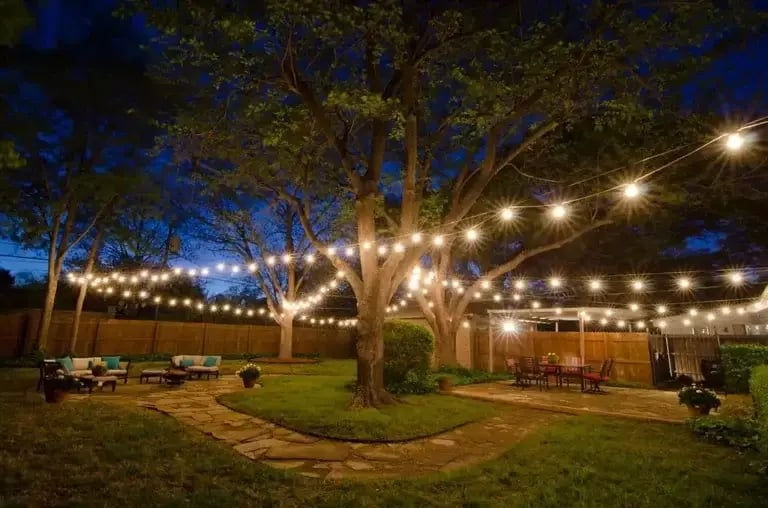Pros and Cons of Using Solar Lighting in Iowa
July 17th, 2025
4 min read

You’ve seen solar outdoor lights in friends’ yards or scrolling online, and maybe you’re wondering: Would these work for my home?
It’s a fair question. With so many lighting options out there, wired, battery-powered, and solar, it’s not always clear what’s best. You want something that looks good, works when you need it, and fits your budget. But will solar lights hold up in Iowa weather? And are they bright enough to be useful?
At Integra Electrical, we have installed hundreds of outdoor lighting systems every day and tested solar lights to see them in action enough to know the ups and downs. We’re here to give you a clear, honest look at whether solar outdoor lighting is the right choice for your yard.
Before the end of this article, you will know
- How Solar Outdoor Lights Work
- The Pros and Cons of Solar Lights
- Frequently Asked Questions About Solar Lights
How Solar Outdoor Lights Work (and Why It Matters)
At first glance, solar lights seem like a no-brainer. They don’t require wiring, permits, or a visit from an electrician. Most fixtures are ready to go right out of the box, just stake them into the ground or mount them to a post, and you’re done.
Here’s what’s happening inside:
- A tiny solar panel gathers sunlight during the day.
- That energy is stored in a small rechargeable battery.
- When the sun sets, a built-in sensor tells the LED light to turn on using that stored energy.
It’s a clever little system, and when everything lines up just right, it works.
But that’s the catch: it has to line up just right. The performance you get depends entirely on how much sun the panel gets, how old the battery is, and whether the fixture is placed in the perfect spot. And let’s be honest, with Iowa’s unpredictable weather (hello, January snowstorm after a 50° weekend), consistent sunlight isn’t always a guarantee.
So while solar lights can work, they aren’t always the most reliable solution, especially if you're hoping for year-round performance or lighting you can set and forget.
The Pros and Cons of Solar Outdoor Lights
The Pros of Solar Outdoor Lights
There’s a reason solar lights are so popular. For the right situation, they offer some appealing benefits, especially if you’re just looking for something simple or a cheap, quick fix.
- Environmentally friendly. Solar lights run on renewable energy, so they don’t add to your electricity bill or your carbon footprint.
- Cheap upfront cost. Most solar lights are inexpensive, often under $50 per fixture, making them an easy way to light up your yard without a big investment.
- No permits or wiring are required. Since they’re not tied to your home’s electrical system, you can install them without calling an electrician.
- Easy to move or replace. Want to change your layout or replace a broken fixture? Just pick it up and move it; no tools or digging needed.
- Great for temporary use. Hosting an event? Decorating for the holidays? Solar lights are ideal for short-term setups or homes where you don’t want to invest in permanent lighting.
The Cons of Solar Outdoor Lights
While solar lights can work, they come with some common frustrations, especially if you’re expecting them to perform like a wired lighting system.
-
Inconsistent performance. Cloudy days, shaded areas, and short winter daylight hours (hello again, Iowa) can all prevent solar lights from charging fully. That means dim light, or no light at all, when you need it most. Solar lights just don’t get the same results everywhere, and places with long winters may see less consistent performance depending on how much sun they get.
- Limited brightness. Most solar fixtures don’t put out much light. They’re fine for a gentle glow, but not strong enough for security lighting or anything task-related.
- Shorter lifespan. Many solar lights are made with lower-quality materials to keep costs down. That can mean cracked housings, faded finishes, and lights that stop working within a year or two.
- Battery maintenance. The built-in batteries wear out over time and need to be replaced every 1–2 years. When they go bad, the light may stop working altogether.
- Not a polished look. Because solar lights are made to be easy and cheap, they don’t always blend well with your landscaping or architecture, especially if you’re going for a clean, custom look.
Frequently Asked Questions
Do solar outdoor lights actually work?
They do, just not always consistently. If the lights get enough direct sunlight during the day, they can glow for several hours at night. But cloudy days, shade, and battery wear can affect performance.
Will solar lights work during Iowa winters?
Sometimes, but not reliably. Short days, overcast skies, snow, and freezing temperatures make it tough for solar lights to charge fully and stay lit.
How long do solar lights usually last?
Most budget solar lights last 1–3 years. The built-in batteries typically need replacing every 12–24 months.
Are solar lights bright enough for walkways or security?
They’re good for gentle accent lighting, but not ideal for brightness or safety. If you need dependable, strong lighting, wired fixtures are a better fit.
Should I choose wired lighting instead?
If you want lighting that works year-round, stays bright, and lasts for years without hassle, wired lighting is likely the better option.
So… Do Solar Outdoor Lights Really Work?
Yes, they can work. But whether they work well enough for you depends on what you need from your outdoor lighting.
Solar lights can do the trick if you’re looking for something quick, cheap, and temporary. But if you want lighting that’s bright, reliable, and built to last through Iowa winters and unpredictable weather, it might be worth looking into something more permanent.
At Integra Electrical, we specialize in wired outdoor lighting systems that are custom-built for your home. We don’t install solar lights, but we’re happy to help you decide what type of lighting makes the most sense for your space, your goals, and your budget.
If you're curious about professional-grade lighting solutions, you can explore our outdoor lighting pricing to see what’s possible.
Jaime Carpenter is the founder and Vice President of Integra Electrical, a mom of five, and a homeowner who understands the importance of keeping your family safe—especially in older homes. With decades of leadership and life experience, she brings both heart and know-how to every home Integra serves.
Topics:





